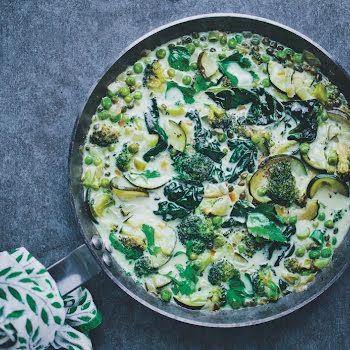By Grace McGettigan
25th Sep 2020
25th Sep 2020
What is kefir
Kefir isn’t just some fad among health-conscious folk. I’ve recently learned it’s something we all should be drinking
I’ve been drinking kefir for approximately three weeks – and I have many thoughts.
Having first heard about it from a family member (who said she felt great results) I was eager to try it. The drink boasts a number of health benefits, and as someone who is often sickly and under-the-weather, I figured it was worth a go.
What is kefir?
For those of you who have never heard of kefir, imagine a glass of slightly lumpy, gone-off milk. Or thick, natural yoghurt. It’s a bit like that in appearance and texture.
More specifically, it’s a live-cultured milk drink. One serving contains billions of naturally occurring live bacteria (exceptionally good for your gut), which develop and multiply during the fermentation process.
What’s more, it’s rich in antioxidants, antibodies and metabolites, as well as some vitamins and minerals.
While kefir is fairly simple to make at home, I prefer to buy mine ready-made; namely this one by Nourish, which is available from my local health food store.

Why drink it?
Kefir is great for the gut – and a happy gut makes for a very happy, healthy body (in fact, the word ‘kefir’ comes from an old Turkish word, meaning ‘good life’ or ‘long life’).
Our gut needs good bacteria (also known as gut flora or gut microbiota), and kefir is full of it. Not only does good bacteria help us digest and absorb nutrients from our food, but Dr Megan Rossi (AKA the Gut Health Doctor), says it can also impact other conditions, such as depression, diabetes and autoimmune diseases.
But how? Put simply, a large part of our body’s immune system is located within the digestive system. So-called ‘good’ bacteria help to keep this balanced, by neutralising toxic by-products of digestion, reducing harmful substances, and discouraging ‘bad’ bacteria (such as salmonella) to grow.
Not only that, but good bacteria helps to stimulate the digestive process and aid the absorption of nutrients (nutrients which will then benefit the rest of our bodies).
You can take all the vitamin supplements you want, but if your gut isn’t healthy enough to absorb them, you’re missing out.
My overall impression of kefir
Three weeks in, my body is responding well to the kefir. Apologies for oversharing, but my trips to the bathroom have become a lot more regular. My IBS has settled down and my gut is now in a healthy rhythm.
Toilet trips aside – I’m hoping kefir will help to strengthen my immune system over the coming winter. So far, I’m feeling good and I’m confident this will continue.
As for the taste – it’s quite sour and is far from a vanilla milkshake. Still, it’s not sickening or unbearable. I actually enjoy drinking my 250 millilitres each day (plus it fills me with an ‘I’m doing something incredibly healthy’ sense of smugness).
The only downside to kefir (from what I can see) is its price point. One 500 ml bottle costs me more than €5 and lasts just two days. Considering I’m drinking it every day and will continue to drink it for the rest of my life, it’s pricey. We’re talking €1,000 a year, pricey. But still, I don’t buy takeaway coffees so it sort of balances out. Right?
Would I recommend kefir? Definitely. The science proves it works and that’s good enough for me.
Photo: Pexels
Read more: Do you have IBS? Dr Megan Rossi shares five lessons about gut health
Read more: 5 delicious vegan-friendly spots to try for a Sunday brunch
Read more: It’s time for ALL restaurants to offer healthy meal options for children























